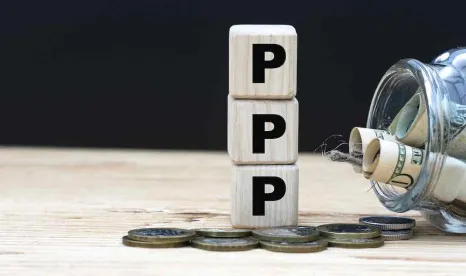The new American Rescue Plan Act[1] (ARPA) as signed into law earlier this month provides for $1.9 trillion in economic stimulus, supplementing last year’s Coronavirus Aid, Relief, and Economic Security (CARES) Act[2] and its $2.2 trillion allocation, both undertaken in response to the economic impact of the COVID-19 pandemic in the United States. Together, the programs provide for billions of dollars in government funds for direct payments and grants to businesses, perhaps most notably though the Paycheck Protection Program (PPP). As of March 21, 2021, more than $718 billion in PPP loans were approved,[3] and ARPA allocated an additional $7 billion for the PPP as well as $28.6 billion for new Restaurant Revitalization Fund grants.
While the PPP provides for loan forgiveness, forgiveness requires a certification[4] by the borrower regarding usage of the funds “to retain workers and maintain payroll” that would subject borrowers to potential False Claims Act (FCA) enforcement and/or criminal enforcement[5] for potential fraudulent or false statements. Likewise, both the initial PPP loan application[6] and forgiveness application[7] include certifications as to eligibility and usage, and the recently enacted Restaurant Revitalization Grants under ARPA also require certification,[8] although applications for the latter are not yet available. In each instance, such certifying language triggers potential FCA and/or criminal liability if misused.
The FCA[9] “imposes significant penalties on those who defraud the Government.”[10] It has been described as “one of the most important tools [the government has] to fight health care fraud, grant fraud, financial fraud, government-contracting fraud, and many other types of fraud on the taxpayer.”[11] In Fiscal Year 2020, the Department of Justice recovered over $2.2 billion in civil cases involving fraud and false claims against the government.[12] Under the Biden administration, it is anticipated that FCA enforcement will continue to remain a key priority. Specifically, enforcement of pandemic-related fraud, including schemes involving “false representations regarding eligibility, misuse of program funds, and false certifications pertaining to loan forgiveness” will be of particular importance.[13] The FCA will undoubtedly “play a significant role in the coming years as the government grapples with the consequences of this pandemic.”[14]
The government has and will continue to use criminal enforcement in cases that involve a clear intent to commit fraud. The Department of Justice, including its 93 U.S. Attorneys, and other federal law enforcement agencies, including the FBI, the HHS Office of Inspector General, the IRS Criminal Investigations Division, the U.S. Postal Service Postal Inspection Service, and the FDIC Office of Inspector General, are involved in these efforts, and many have established coronavirus fraud task forces. As one recent prosecution—of a $24 million fraud scheme involving PPP loans—demonstrated, “[t]he Justice Department is committed to protecting the PPP from fraud and deceit.”[15] In another example on March 8, 2021, “a Florida couple pleaded guilty for their participation in a scheme to file four fraudulent loan applications seeking more than $1.1 million in forgivable [PPP] and Economic Injury Disaster Loans (EIDL) loans guaranteed by the Small Business Administration” under the CARES Act.[16] In the applications submitted, the defendants falsely stated they employed several employees in various businesses, when, in fact, there were no such employees.
In many instances, the conduct will not be so clear-cut. The government, in an effort to prevent fraud, may question legitimate loan applications and initiate an FCA investigation. For instance, the standard is much less than the proof beyond a reasonable doubt required to prove a criminal fraud violation. To establish liability under the FCA, the government need not show that an individual or business knew that the information submitted was false.[17] Instead, the government need only to establish that the person or business acted “in deliberate ignorance of the truth or falsity of the information,” or “in reckless disregard of the truth or falsity of the information, and no proof of specific intent to defraud is required.”[18] Even if conduct were inadvertent—for example, falling below the required threshold of employees after a company’s PPP loan application were submitted—it is important to be mindful and proactive.
[1] American Rescue Plan Act of 2021, H.R. 1319, 117th Cong. (2021), https://www.congress.gov/bill/117th-congress/house-bill/1319/text.
[2] Coronavirus Aid, Relief, and Economic Security Act, S.B. 3548, 116th Cong. (2020), https://www.congress.gov/bill/116th-congress/senate-bill/3548/text?q=product+actualizaci%C3%B3n.
[3] U.S. SBA, “Paycheck Protection Program (PPP) Report,” available at https://www.sba.gov/sites/default/files/2021-03/PPP_Report_Public_210321-508.pdf.
[4] See CARES Act, Sec. 1105, subsection f, https://www.congress.gov/bill/116th-congress/senate-bill/3548/text?q=product+actualizaci%C3%B3n#id64654EA7E8BB43CAB96CCE8C20148221.
[5] See 18 U.S.C. § 287 (submitting false claims to the government); 18 U.S.C. § 1001 (false statements); 18 U.S.C. § 1341 (mail fraud); 18 U.S.C. § 1343 (wire fraud); 18 U.S.C. § 1344 (bank fraud). Maximum potential penalties could include imprisonment for up to 30 years and a $1,000,000 fine.
[7] https://www.sba.gov/document/sba-form-3508-paycheck-protection-program-loan-forgiveness-application.
[8] https://www.congress.gov/bill/117th-congress/house-bill/1319/text#HA033111B8B394487AEA32E047796D8C1.
[9] See generally 31 U.S.C. § 3729 et seq.
[10] Universal Health Servs. v. United States ex rel. Escobar, 136 S. Ct. 1989, 1995 (2016).
[11] U.S. DOJ, “Deputy Associate Attorney General Stephen Cox Provides Keynote Remarks at the 2020 Advanced Forum on False Claims and Qui Tam Enforcement,” Jan. 27, 2020, available at https://www.justice.gov/opa/speech/deputy-associate-attorney-general-stephen-cox-provides-keynote-remarks-2020-advanced.
[12] U.S. DOJ, “Justice Department Recovers Over $2.2 Billion from False Claims Act Cases in Fiscal Year 2020,” Jan. 14, 2021, available at https://www.justice.gov/opa/pr/justice-department-recovers-over-22-billion-false-claims-act-cases-fiscal-year-2020.
[13] U.S. DOJ, “Acting Assistant Attorney General Brian M. Boynton Delivers Remarks at the Federal Bar Association Qui Tam Conference,” Feb. 17, 2021, available at https://www.justice.gov/opa/speech/acting-assistant-attorney-general-brian-m-boynton-delivers-remarks-federal-bar.
[14] Id.
[15] U.S. Attorney’s Office for the Northern District of Texas, “Coppell Man Pleads Guilty to $24 Million COVID-Relief Fraud Scheme,” March 24, 2021, available at https://www.justice.gov/usao-ndtx/pr/coppell-man-pleads-guilty-24-million-covid-relief-fraud-scheme.
[16] U.S. DOJ, “Couple Pleads Guilty to $1.1 Million COVID-Relief Fraud After Falsely Claiming to Be Farmers,” March 8, 2021, available at https://www.justice.gov/opa/pr/couple-pleads-guilty-11-million-covid-relief-fraud-after-falsely-claiming-be-farmers.
[17] Charles L. Kreindler et al., “Tips for the Unwary: Precautions Against Liability for Healthcare Businesses Receiving CARES Act Funds,” The National Law Review, June 2, 2020, available at https://www.natlawreview.com/article/tips-unwary-precautions-against-liability-healthcare-businesses-receiving-cares-act.
[18] Id.; see also 31 U.S.C. § 3729(b)(1).




 />i
/>i
